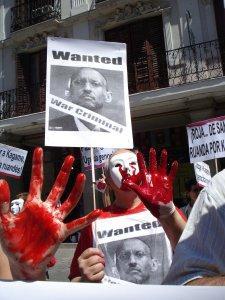 “To be, or not to be…” is the opening phrase of a dialog in the “Nunnery Scene” of William Shakespeare‘s play Hamlet.
“To be, or not to be…” is the opening phrase of a dialog in the “Nunnery Scene” of William Shakespeare‘s play Hamlet.
The British writer carries on in the dramatic piece with the following verses:
“Whether ’tis Nobler in the mind to suffer
The Slings and Arrows of outrageous Fortune,
Or to take Arms against a Sea of troubles,
And by opposing, end them? To die, to sleep—
No more; and by a sleep, to say we end
The Heart-ache, and the thousand Natural shocks
That Flesh is heir to? ‘Tis a consummation
Devoutly to be wished. To die, to sleep,
To sleep, perchance to Dream; Aye, there’s the rub,
For in that sleep of death, what dreams may come,
When we have shuffled off this mortal coil,
Must give us pause. …”
In the Rwandan president life’s tragedy – if one can make some comparison -, it is not himself whose life is in danger. It is not neither about being close to losing it because he cannot decide whether or not to spare it. But it is the lives of people around him, millions of ordinary Rwandans and other citizens of countries of the Great Lakes region which are in question.
The issue of a general question raised here that the Rwandan president must constantly have on his mind is about his most recent public victim: Dr. Emmanuel Gasakure, his own former personal doctor.
Thus, for Paul Kagame, contrary to Hamlet’s intentions in the abovementioned shakespearian drama, the existential question has apparently always been: TO KILL OR NOT TO KILL.
Killing is for him like a mark of his character. That he lives up to 100 years or die today, nobody will ever know how many people the Rwandan president killed directly or indirectly under his orders or policies.
If I was much younger I would make it a personal academic goal to study and analyze the Rwandan president professional carrier and find out approximately how many people in time and space were killed because of him.
From the facts about his crimes that have so far been gathered particularly since 1990, I am quite certain he would be among the most prolific killers that the humankind has ever known in a position of political leadership.
Pending questions that could be highlighted while analysing president Kagame’s processes in deciding TO KILL OR NOT TO KILL include:
What are the important deciding factors, from the Rwandan president’s perspective, for anyone being killed?
Do the afterwards feelings of the family of the victim ever come into consideration?
Is what the victim was worth easily replaced once the crime is committed?
Does it matter at all to fill the gap caused, or are different arrangements made?
Does the killer really care about the consequences of killing someone beyond his own interests?
Does the killer think that he might one day die too, however how?
Does he too have a family that would have to bear the sorrow of his death?
Does Kagame’s decision of killing someone or going after entire communities solve the issue he has at hand?
Is there any external advice in the decision being taken?
Did the killing start with a bang or evolve gradually up to a certain mastery like for example cooking chefs who with time can cook almost with their eyes closed, because they know all the necessary ingredients for a good meal?
Did the killer start by killing someone or minor offenses?
These are some of the questions understandably relevant that someone trying to study the criminal character of the Rwandan president must raise and look into.
